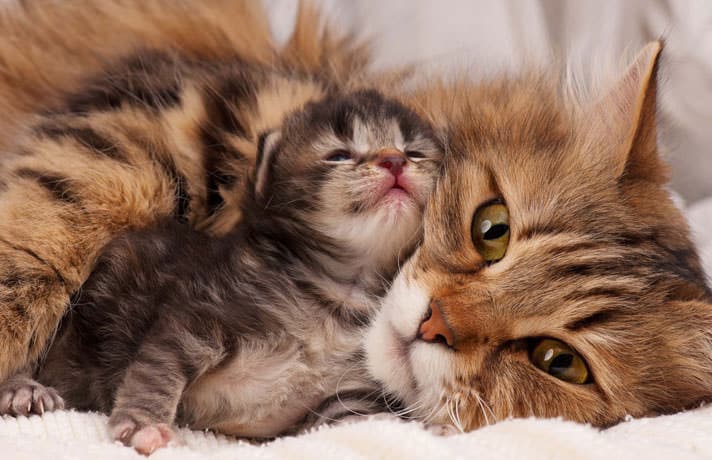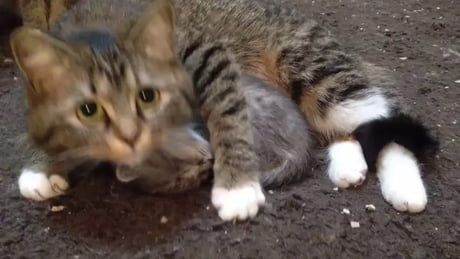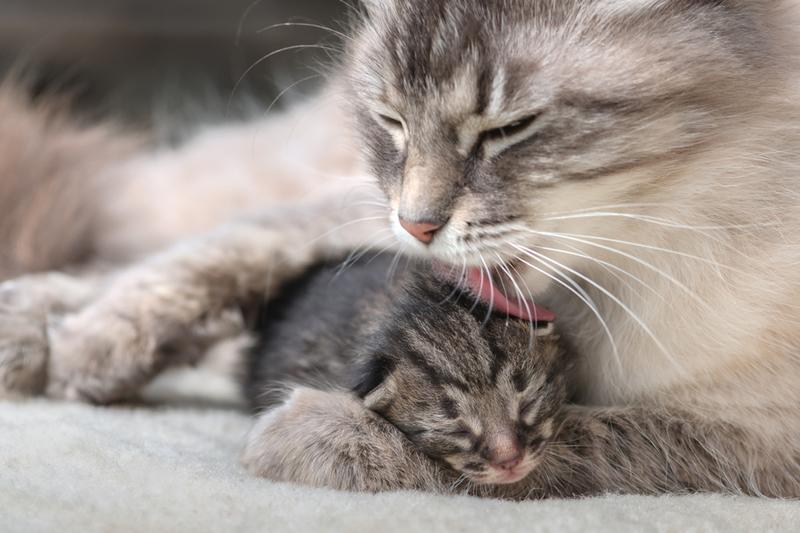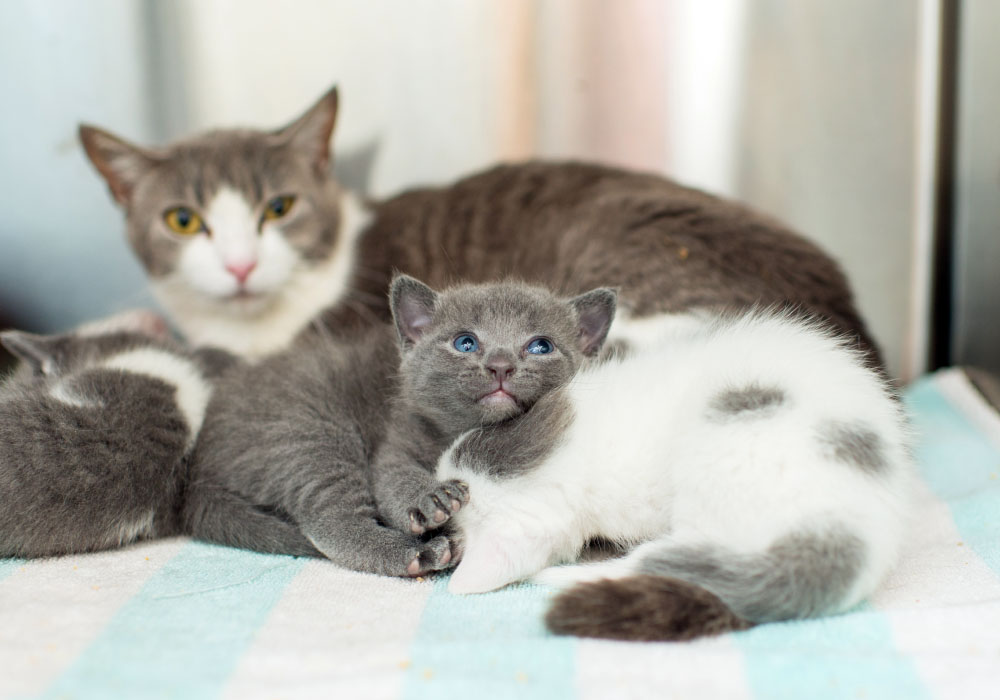The feline breeding process is quite fascinating. Right from mating to pregnancy to birthing and finally watching the kittens grow will blow your mind.
If you’ve had the privilege of being a part of it firsthand, you can attest to this.
Mother cats, or queens, as they are referred to, are some of the strongest, most hardy creatures on earth. They carry the entire burden of caring for the young until all the kittens are independent.
Baby daddies are never in the picture. As a matter of fact, they are seen as a danger to kittens.
Mother cats do all there is to ensure their kittens are safe and healthy.
From stimulating their young to eliminate by licking their nether regions to moving their babies when they sense danger, they can do it all.
Sometimes they kill one or two kittens that are weak just to save the rest.
Amongst the countless things queens do for their kittens, sitting on them is one of the most worrying.
Whether you are a first-time parent or an experienced one, nothing prepares you for the sight of watching your cat sit on her kittens.
Considering the weight differences between the mother cat and the newborn kitten, this behavior can crush the young kitty in a flash.
So, what’s going on?
We explain in detail below including what you can do.
1. Inexperience

For the most part, first-time kitty parents tend to be the ones with a long list of unbelievable breeding actions. It comes with the territory of being a novice queen.
True, a cat’s motherly instincts kick in when she gives birth but experience has its place as well. For instance, a new entry may not really know how to handle 10 kittens who want to nurse all day long.
If there are signs of danger around her, she may feel too overwhelmed and ultimately become stressed.
Stress can cause a cat to behave in ways that seem strange to us. She may reject one of the kittens, sit on them, kill them, or stop feeding them.
What to Do
An inexperienced mother cat that is showing signs of being overwhelmed definitely needs help. If you let her be, she may end up killing all her kittens.
First of all, you need to establish that this is the sole reason she is sitting on her babies.
Watch how she takes care of her litter. Is she feeding all the kittens? Does she hide from them for long periods of time? Does she seem bothered when one of her kittens is crying for help?
These questions will help you know if the queen is inexperienced or not.
Once you’ve established that a lack of experience is causing the mother cat to sit on her young, consider helping her.
First, be sure to pet and cuddle with her when she gets time away from her kittens. This brings a sense of soberness and helps her deal with all the changes in her life.
Secondly, be sure to feed her well as she nurses the kittens. If she’s aggressive, place food and water bowls outside her nursing area and let her be.
If the queen lets you near her kittens, rise to the occasion and help whenever you can. Do this several times a day and if you find the queen sitting on her kitten (s), find a way to stop her.
She may be trying to intentionally harm the young so that she can lessen her own burden.
When you realize that the cat is not showing signs of stopping the behavior, consider finding a surrogate mother for the kittens.
You can also be the human mother if you are willing.
2. Protection

Like a hen broods over her chicks, mother cats can also sit on their kittens as a way to protect them.
Well, in all honesty, this is not normal feline behavior but some kitties may go this direction for reasons best known to them.
By sitting on the kitten, your queen is trying to hide the young from predators.
In the wild, danger always lurks around. Your kitten can be discovered and turned into dinner by all kinds of animals.
You can tell your kitty is worried about the safety of her kittens if she’s intent on moving them around frequently alongside sitting on them. She may also do that to provide warmth.
What To Do
The best course of action here would be to create a perfectly safe spot for your cat and her brigade.
If you haven’t done so already, make a box that will fit your cats and line some newspapers at the bottom of it.
Next, place the box in a secluded, low-traffic, dark area at home.
If possible, keep everyone at home (dogs, pets, kids, and adults) from accessing the box.
Let the mother cat and her kids be alone for a few days. Simply check on her occasionally to see if she’s still sitting on her kittens or not.
3. Accidents

While a mother cat sitting on her cat may be caused by something complex, it may also be accidental.
Cats, like human beings, can unknowingly err. Even the most experienced of kitties can step on their kitty from time to time.
A queen may sit on her kitten by mistake when trying to feed the entire bunch or when trying to make sure that everyone is happy.
What to do
Typically, if the mother cat doesn’t sit on the kitten for more than five seconds at a time, you shouldn’t be too worried. It just means that she’s made a mistake and will improve.
If this is her first litter, give her time and she will get better at her responsibilities.
Just keep monitoring her constantly to make sure that she is no longer sitting on one of her babies.
You might also want to check the size of the box (if she’s using any). As the kittens grow, they occupy more space. Check to make sure that the box is big enough at all times to fit all the cats and thus reduce the chance of accidents.
Also, ensure that the breeding area is as comfortable and cozy as can be. This way, the mother cat will not find a reason to move her babies around. Ultimately, this will reduce the occurrence of accidents greatly.
Parting Thoughts
There it is – three reasons mother cats sit on kittens.
The bottom line is that you should carefully monitor the queen and her litter to know where the problem lies.
If nothing suggested here seems to work, the kittens are better off being raised by an experienced, surrogate mother.
Related Posts:
Mother Cat Crying for Kittens: What Does It Mean? (Plus What To Do)
Do Cats Eat Their Kittens If You Touch Them?

Hi! I am Eleanor Price. I started this website after my cat, Louie, almost died from a case of botulism (a type of food poisoning often caused by bacteria that grow on food items). Turned out that my cat’s diet was the problem. I have made it my duty to provide the best information and recommendations about everything cat lovers need to know about their felines’ health and wellbeing. My goal is to find the most informative content on anything feline-related and share it with fellow hardworking kitty lovers.

